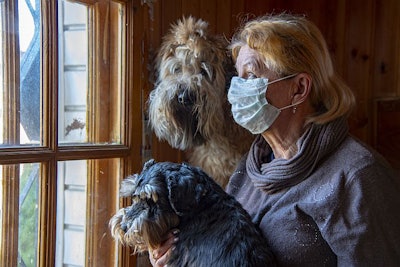
There has been a lot of buzz, even in mainstream media, about the rise in pet adoptions since the COVID-19 pandemic forced us all to hunker down at home, seeking comfort from furry, feathered and even scaled family members. Market watchers such as Packaged Facts and Nielsen credit the adoption surge with helping boosting sales of pet food and other pet supplies, just about every category except services.
Yet many people are hurting financially, so it’s no surprise that some industry experts are expressing concern that pet owners in dire straits may have to eventually relinquish their pets – concern that starts with the pets and their owners, first and foremost. In early October 2020, an article in USA Today by Jen Reeder began with a heartbreaking story about a pet owner in California who lost his business and had to give up his three beloved dogs to a shelter. Reeder also interviewed shelter professionals from other areas of the U.S. who, while not discussing pet relinquishment, did talk about the number of pet owners in their areas who were facing financial hardship and depending on donations of pet food and other pet care services.
While I have no doubt that is happening, it is difficult to find data on the severity of the pandemic and economy’s impact on pet ownership and care. Reeder cited August 2020 figures from the American Society for the Prevention of Cruelty to Animals (ASPCA) “estimating that 4.2 million pets will enter poverty in the next six months as a result of the COVID-19 crisis, a 21% increase from pre-pandemic estimates. The total number of animals living in poverty could rise to more than 24.4 million dogs, cats, horses and other animals.”
That data paints a very bleak picture but, though based on previous ASPCA research, it’s speculative and now a couple of months old. Do we know what the current reality is?
Current state of U.S. pet ownership
In September, the American Pet Products Association (APPA) conducted the third round of its “COVID-19 Pulse Study: Pet Ownership During the Pandemic.” The first two rounds took place in May and June, respectively.
The latest data shows very few changes in U.S. pet ownership since late spring/early summer; and specifically, only 2% of respondents have had to give up a pet (compared to 1% in June). More telling, perhaps, is that a small drop in the percentage of respondents saying their pet ownership situation has not changed – 83% compared to 87% in June – seems due to a slight increase in the percentage of owners adopting new pets, 9% compared to 6% in June.
However, 10% of the pet owners surveyed by APPA did say they may have to give up their pets, and a consistent share harbor concerns about their financial situations over the three rounds of surveys. For example, 43% said the pandemic has significantly impacted their household’s finances, and 55% are very concerned about their finances over the next year. That percentage is nearly the same for those concerned about their finances over the next couple of months, which stood at 54% in September; that has risen from 50% since June.
Percentages of pet owners whose employment status has changed have remained consistent, too, with 13% in September reporting being currently unemployed or furloughed, the same as in June. Another 15% of recent respondents said their hours or wages have been reduced, close to the 16% in June. A small percentage, 5% for both June and September, had been laid off or furloughed previously but were back to work at the time of the respective survey.
Most pet owners sticking with their pets’ diets
So, not all is rosy for many pet owners in the U.S., and while we hope projections like those from ASPCA and other humane organizations don’t come true, it seems naïve to think the ongoing pandemic and recession won’t affect more pet owners and lead to some pet relinquishment. At the very least, it’s highly likely the need for pet food donations and other assistance will continue to grow.
The pet owners surveyed by APPA seem to take a long view: “In May, 28% thought the pandemic would be over in two-three months or less, while 21% thought it would take more than year,” read the report. “In September, only 17% of those surveyed think normal will return in two-three months, while 31% think it will be more than a year from now.”
Still, only 18% in September said they plan to spend less money on pet food, given their current finances, very close to the 16% in both May and June. The same percentage in September, 18%, said they plan to switch to a different brand of pet food to save money, also very close to the May and June figures. On the flip side, 72% in September said that because of the importance of their pet’s diet to them, they don’t plan to make any changes to it regardless of their finances (also consistent with May and June).
Those 18% figures are somewhat concerning, and bear monitoring to see if they increase as the pandemic and recession wind on. For now, the picture of pet ownership and pet food spending seems mostly sunny, partly cloudy with a chance of storms on the horizon.
View our continuing coverage of the coronavirus/COVID-19 pandemic.



















